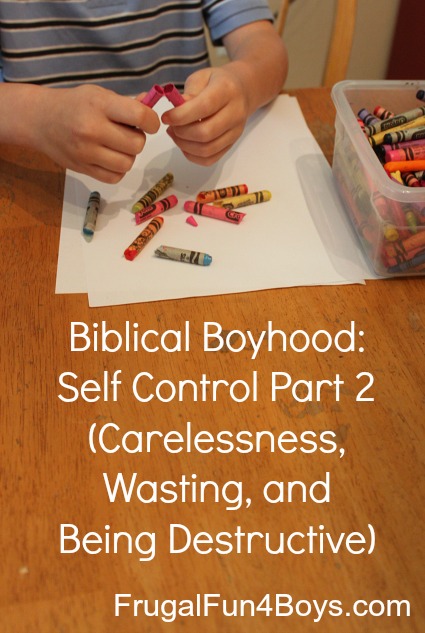At the end of August, I wrote a post on teaching children, especially boys, about self control. The focus of that post was childish behavior vs. foolish (sinful) behavior.
I received this extremely insightful comment on that post:
“I often address self-control with my two children in terms of “taking care of people and things.” We remind them to play in a way that they are care takers and not destroyers, just like Jesus was. Self-control obviously is a fruit with more far reaching implications, but at almost-3 and 4 1/2 this is the most present application. What a marvelous thing that Christ kept His head about Him and made judicious decisions for 30-some odd years so that He could take care of us!”
I thought that this comment was very helpful. We have always expected the boys to make things right when they break something (either accidentally or on purpose), but I hadn’t thought of talking to them about being care takers rather than destroyers and about how that relates to self-control.
One thing that I have noticed about boys is that in general, boys think it’s interesting or even funny when something breaks, whereas girls are more likely to cry or be sorry. This is obviously not always the case, but I have not yet had a boy who is naturally remorseful when something breaks. When I was little, I accidentally broke a ceiling light fixture with a ball. My mom said that I was burst into tears! Definitely not the case around here. I have a friend who has 5 girls, and she told me once about babysitting some boys and chuckling at the differences. They were watching a movie, and one of the boys (age 2 or 3) kicked over the bowl of popcorn just to see what would happen. He wasn’t trying to be bad – just investigating!
Obviously we don’t want our sons to grow up to be men who are wasteful, destructive, and careless, but how do you go about teaching that to someone who thinks destruction is funny?
1. Start with the Scripture.
What does the Bible say about destruction of property? Philippians 2:3-4 says that we are not to do anything out of selfishness and that we should treat others as more important than ourselves.
Selfishness, or doing what is enjoyable despite the cost it presents to others, can actually go a couple of different ways. Some children are more tempted by laziness, while others are more tempted to be wild and high-energy. The lazy child might be more prone to leave toys or shoes out to be ruined in the rain, while the high energy child puts a doorknob shaped hole in the wall while playing chase in the house (we’ve had this happen… ugh) or breaks a sibling’s toy while being silly with it. In either scenario, the child is being selfish by carelessly creating unnecessary work and expense for someone else.
Matthew 7:12 says that we are to treat others the way that we would like to be treated. It is a process for children to learn to see things from another person’s perspective, but it’s an important skill to learn!
So, instead of being careless, we should care for others. We should work to help them and take care of their things, not create extra work or expense for them.
2. Start at an early age requiring children to make things right when they ruin something, whether it is purposeful or accidental.
Making things right is just part of being a responsible person, and if you start young and keep your frustration out of it (that’s the hard part), children will view cleaning up or fixing something as just part of life.
We had this little incident in our house last week:
This is, well was, a violin rosin. I am a violinist, and I am teaching the older three boys violin. Last week, I discovered that someone had touched the rosin with very sticky fingers. Unfortunately, I didn’t notice this until after I rubbed it all over Gresham’s bow! We went to the music store and had the bow hair cleaned, and then I bought a new rosin for me (above) and a cheaper one for the boys to use so that they would not be handling mine anymore. Well, before I even used the new rosin, one of the boys opened the box to check it out, dropped it, and it shattered on our tile floor. It’s a house rule not to get into any violin things, and so Daddy decided that he would do chores around the house to earn the money to pay for the new rosin. Neither of us were angry with him about this, but we calmly explained that when we break someone else’s things, even if it’s an accident, we fix or replace the item.
Here are other things that the boys have paid for or fixed over the years:
- Fines for overdue library books that were “lost” under the bed
- Fine at the library for a destroyed video cover
- Money for supplies to repaint a door after toys were thrown at it
- Fine to mom and dad for pouring a huge bowl of cereal and then wasting half of it. We did not charge the first time (or the second or third), but because this has become a habit, it now costs 50 cents.
- Helping with laundry after wiping one’s fingers on clothes instead of a napkin
- Mopping up mud off the floor after forgetting to take off dirty shoes
- Cleaning out the van after ripping up a styrofoam cup in the back seat
3. Teach about self control at times when kids are not already in trouble.
As I wrote in my earlier post on self control, learning to think through decisions is a process for boys, and a long one at that! When a child is in trouble, he’s probably not at his most teachable. It can be good to discuss “what if” scenarios and think through wise choices at a more neutral time.
Here are some ideas for dinner table self control discussions. For any of these, you can ask questions like, “What are some risks to be aware of in this situation? What would be the proper safety precautions to take? How might your actions either help or bother someone else? What would be appropriate behavior for this situation?”
- Playing baseball in the yard
- Bike riding on busy streets
- Using items that are not yours
- Washing/putting away dishes
- Playing with a group of friends
- Eating at a nice restaurant
- Playing at the park/creek/woods with friends, and no parent can see what you are doing
- Sitting in a church service
4. Play together and provide high energy activities that are fun and appropriate.
This sounds obvious, but I sometimes find myself forgetting that the boys need time to get outside and ride bikes and throw a ball. Aidan (age 10) really enjoys having “real” jobs to do, like hammering nails back in the swing set, hammering on replacement fence slats, raking leaves, etc. One day, he had a blast helping my dad clear dead tomato plants out of their garden. He loves to use a shovel and the wheelbarrow. Boys need opportunities to dig, climb, and throw things. Play chase, hide-and-seek, and shoot Nerf guns or water guns. Don’t say “no” to everything active!
For active play ideas, check out my post on 10 Ways for Kids to Burn off Energy.
If you found this post helpful, be sure to check out the rest of the Biblical Boyhood series:
Part 2: Fighting, Retaliation, and Bullies
Part 3: Setting an Example of Biblical Speech: A Challenge for Moms
Part 4: Setting an Example of Biblical Speech Part 2



11 Comments
TheYankeeGirl Nov 3, 2013
Thank you! Thank you! Thank you! The Lord always guides you to where you need to be! I had a particular hard day with my almost-3-year-old son today with this particular issue, and it just sent me over the edge with a pretty harsh yelling rant from me. (Nothing better than teaching your child how to throw a tantrum correctly!) I pray for patience and guidance every day, and am so grateful that He has guided me to you and your insightful posts. Thank you!
Sarah Nov 5, 2013
I have unfortunately taught my children how to throw a tantrum many times over the years! Thankfully, our kids are usually very forgiving, and we can make progress as a family. Thanks for your comment!
Laura Nov 3, 2013
I started following your blog for the simple fact that you are a mother of all boys. With three (soon to be four) boys ages 6 and under, I find that a little commiseration goes a long way. This and your last post in August about self-control is so familiar that I couldn't help but comment. I think it is so wrong to not expect boys to understand these concepts simply because "boys will be boys." They can, and will live up (or down) to our expectations! They can learn to be sensitive, caring, men of honor who are capable of everything the Savior exemplified. It just takes a different approach and you've outlined a wonderful way to go about it. Thank You!
JJ Nov 3, 2013
Ah, helping with the laundry after wiping fingers on clothes. THAT is a good one for me to use! :o)
Sarah Nov 5, 2013
If I'm remembering correctly, it was a spaghetti dinner that first prompted this rule at our house... :-)
Dottie Nov 4, 2013
Just found your blog--what a blessing! Thank you so much for sharing your thoughts and ideas to spur us on to raise our kiddos in a way that is honoring to our Lord. Printed out your Thanksgiving devotions and looking forward to using it1
sarahelisabeth Nov 4, 2013
This is so useful. Wiping hands on clothing instead of a napkin is something that I need to work on with one of mine: your consequence is so appropriate.
Talking through appropriate behaviour is something that I should do more. One of our children struggles with eating a range of foods and we have used this plus working on appropriate form of words before going to the homes of others.
Thank you for a thought provoking post.
sarahelisabeth Nov 5, 2013
I've just linked to this post. I've been musing on it all day.
Christina Nov 6, 2013
This one resonates with me! I have to say, the way boys treat things have always surprised me. I love how you broke this down and the practical suggestions are very helpful. Thanks for this, Sarah!
Melissa Deming Nov 6, 2013
i love the idea of restitution. We have begun to implement reconciliation when a brother wrongs another, but we haven't had a system for restitution over specific broken items. I think this is brilliant and very biblical! Thank you for the encouragement to do so!
Allison Hendrix Nov 9, 2013
Thought this was great. I've been really enjoying this series. Thank you
Neda Palmerino Dec 31, 2016
Many thanks for the information included and even the pictures, we were trying to find certain products today and also took care of to find your blog, we are leaving these comments to guarantee that you keep composing more information like this
Laura B Dec 14, 2017
Thank you Sarah. I'm really fighting my six year old on destructive behavior lately. When I've tried to find ways to help him handle his destructive urges better and stop breaking things I've just been told/found articles that say it's all my fault because I'm not loving enough and/or don't give him enough attention. While I do believe my behavior affects my children that can't be all it is. Besides sometimes it feels like he's worse after more one-on-one time with an adult. Your post has helped me understand my boys better and given me some realistic thing to do to help them.
Post a Comment